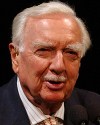You’ve probably heard the joke, “The difference between intelligence and stupidity is that intelligence has its limits.” In this section of Ecclesiastes, the writer, one of the educated and smart guys of his day, is letting us know where all his brainpower got him.
He says in v. 13 that he’s going to use his wisdom—a special gift specifically given to him by God—to examine everything. He plans to not leave any stone unturned. He’s going to look at concrete and abstract realities, both wisdom and science, morality and religion: all that is done under heaven.

He’s says it’s all ultimately unsatisfactory. All the brains in the world doesn’t bring inner peace, and it doesn’t necessarily give meaning to life. Recently (November 2012), Newsweek did a feature article on news anchor Walter Cronkite. They said that in the midst of the Vietnam War, Walter Cronkite was learning the fundamental truth about Vietnam: “One could not depend on things being what they seemed to be.” So it seems with too much of life. You may learn about it, but what is twisted can’t necessarily be straightened if you learn more about it. There is a basic imperfection to things, as if life has gone astray, or now has hypocrisy built right into it. Your intelligence can’t change the way things and people are. There is only so much that extra knowledge can accomplish, and no investigation is going to make up what is deficient.
How much intelligence would it take to get to this point? How much experience? It makes me think of Bob Dylan’s song, “Blowin’ in the Wind.”

How many roads most a man walk down
Before you call him a man ?
How many seas must a white dove sail
Before she sleeps in the sand ?
Yes, how many times must the cannon balls fly
Before they’re forever banned ?
The answer my friend is blowin’ in the wind
The answer is blowin’ in the wind.
Yes, how many years can a mountain exist
Before it’s washed to the sea ?
Yes, how many years can some people exist
Before they’re allowed to be free ?
Yes, how many times can a man turn his head
Pretending he just doesn’t see ?
The answer my friend is blowin’ in the wind
The answer is blowin’ in the wind.
Yes, how many times must a man look up
Before he can see the sky ?
Yes, how many ears must one man have
Before he can hear people cry ?
Yes, how many deaths will it take till he knows
That too many people have died ?
The answer my friend is blowin’ in the wind
The answer is blowin’ in the wind.
So the author turns away from books and science to consider wisdom—technical skills, aptitude, and good sense. What distinguishes what is wise from what is unwise? He hits the wall as he discovers there are no infallible guides. His conclusion? “For with much wisdom comes much sorrow; the more knowledge, the more grief” (v. 18). “The more you understand, the more ache,” says Moffatt. Sometimes being smart just makes it worse, he claims. Have you heard the saying “Ignorance is bliss”? Same idea. Knowledge uncovers a lot of disturbing things.
 We put so much stock in science, and sometimes with reason. Look how much we’ve learned! Look how far we’ve come! Look at how intelligent we are! Science becomes invincible, and we place all our hopes in our brains. The problem is that science is limited in what it can tell us, and sometimes even misleads us when it’s bad science. Jacques Ellul says, “Our author does not say that science lies or fails. He does not consider it of the devil. He says only that it increases sorrow. It pursues the infinite conquest of infinite knowledge, and it will fail. It is coveting equality with God—our own version of the Tower of Babel. A person tries to rise infinitely by means of what he has and knows, and therefore experiences much grief.
We put so much stock in science, and sometimes with reason. Look how much we’ve learned! Look how far we’ve come! Look at how intelligent we are! Science becomes invincible, and we place all our hopes in our brains. The problem is that science is limited in what it can tell us, and sometimes even misleads us when it’s bad science. Jacques Ellul says, “Our author does not say that science lies or fails. He does not consider it of the devil. He says only that it increases sorrow. It pursues the infinite conquest of infinite knowledge, and it will fail. It is coveting equality with God—our own version of the Tower of Babel. A person tries to rise infinitely by means of what he has and knows, and therefore experiences much grief.
“Science becomes more absolute and ultimate than nature or God. In science, there is no love, nor morality, nor justice. Science is bulimic, and it gorges and purges. It is not science’s failings that cause grief, but its successes. It lies to us that meaning can be found in knowledge. Yet science never furnishes us with an ultimate answer, though it pushes ever on.”